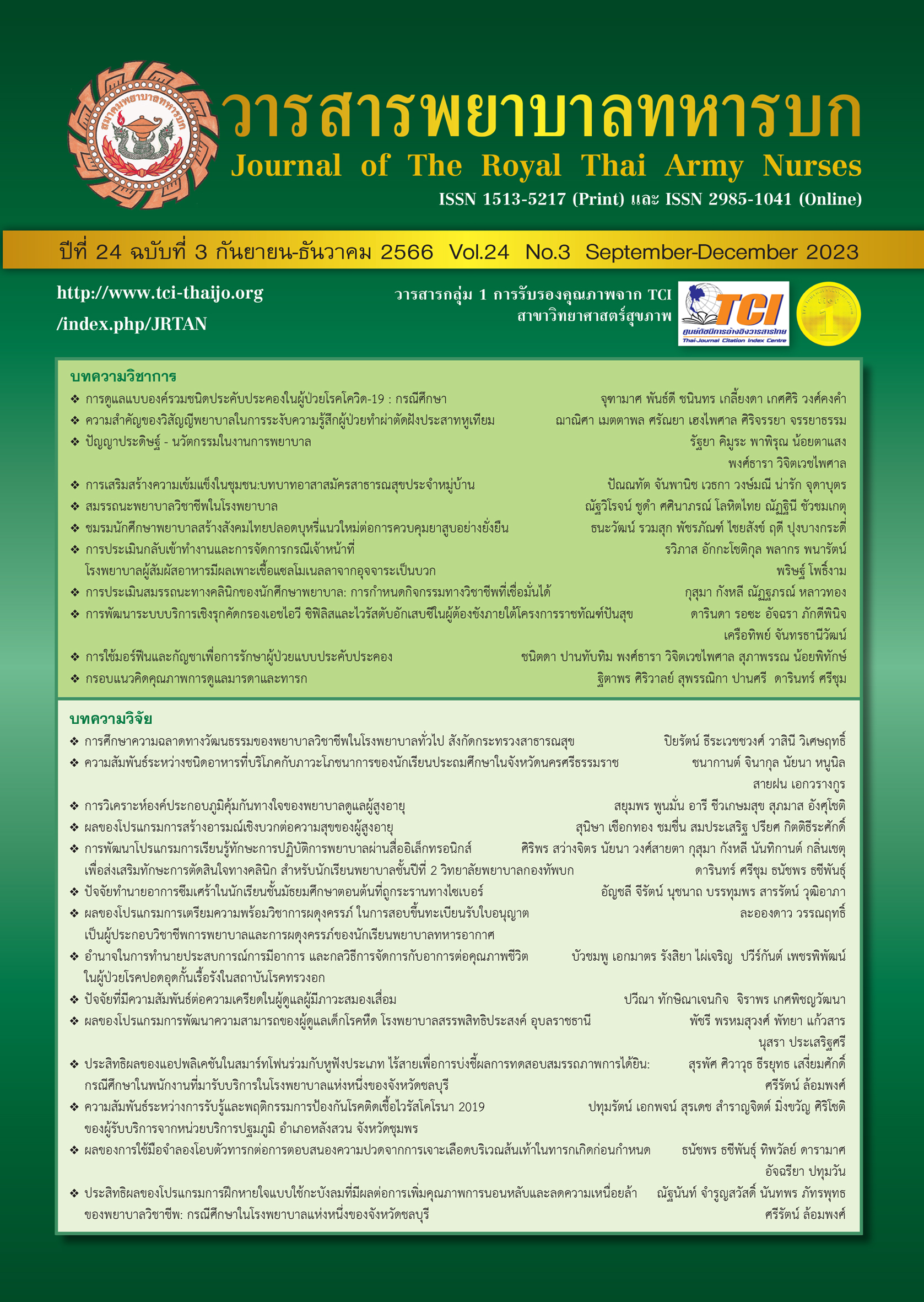Return to Work Assessment and Management of Hospital Food Handlers with Positive Stool Culture for Salmonella
Keywords:
Salmonella, Return to work assessment, Food handlersAbstract
Salmonella is a common pathogen found in stool culture samples in Thailand and Asia. Infections may lead to severe diseases, particularly typhoid and paratyphoid fever, which can be transmitted even in the absence of symptoms. These infections are identified as diseases requiring attention in the food sanitation manual for food service establishments according to the regulations of the Ministry of Public Health’s Food Service Establishment Act, B.E. 2561. Therefore, establishing guidelines for evaluating return to work and managing food handlers with positive stool culture for Salmonella is essential, especially for high-risk groups in a hospital setting
This article aims to review the current literature on guidelines for evaluating return to work and managing food handlers with positive stool culture for Salmonella. As details vary in each country, the review results show that several factors need to be considered for assessment such as pathogens, infectivity, symptoms, treatments, and food handling duties. This article also covers food safety standards, personal hygiene, and self-reporting practices. These are recommended practices to reduce contamination and transmission of the pathogen from food handlers to consumers, as well as for infection control in hospitals.
Downloads
References
Augustin JC, Kooh P, Bayeux T, Guillier L, et al. Contribution of Foods and Poor FoodHandlingPracticestotheBurdenofFoodborne Infectious Diseases in France. Foods. 2020; 9(11): 1644.
Jankusol K, Pimda P, Jindamai S. Fit to work assessment as a food handler: A study of workers who work in food handling areas. The Office of Disease Prevention Control Region 9 Nakhon Ratchasima. 2022; 28(2): 43-52. (in Thai)
Public Health England Salmonella data 2007 to 2016: National laboratory data for residents of England and Wales. London Public Health England; 2018.
MinisterialRegulationonHygieneforFoodService Establishments,2018. RoyalThai Government Gazette. 2018; 135(42): 19-25. (in Thai)
Ministerial Regulation on Market Hygiene, 2008. RoyalThaiGovernmentGazette.2008;125(13): 5-7. (in Thai)
Food Act, 2009. Royal Thai Government Gazette. 1979; 96 (79): 1-28. (in Thai)
Food and Agriculture Organization of the United Nations. General principles of food hygiene CXC 1-1969. Rev ed. Rom: FAO; 2020.
United States. Food and Drug Administration. Food code: 2022 recommendations of the UnitedStatesPublic HealthService,Food and Drug Administration. College Park, MD: U.S. Department of Health and Human Services, Public Health Service, Food and Drug Administration; 2022.
Sirinavin S, Thavornnunth J, Sakchainanont B, Bangtrakulnonth A, Chongthawonsatid S, Junumporn S. Norfloxacin and azithromycin for treatment of nontyphoidal Salmonella carriers. Clinical Infectious Diseases. 2003; 37(5): 685–91.
Gotuzzo E, Guerra JG, Benavente L, Palomino JC, Carrillo C, Lopera J, et al. Use of norfloxacin to treat chronic typhoid carriers. The Journal of Infectious Diseases. 1988; 157(6): 1221-5.
Mandell GL, Douglas RG, Bennett JE, Dolin R, editors. Mandell, Douglas, and Bennett’s principles and practice of infectious diseases. 6thed.NewYork:Elsevier/ChurchillLivingstone; 2005.
Paudyal N, Pan H, Wu B, Zhou X, et al. Persistent Asymptomatic Human Infections by Salmonella enterica Serovar Newport in China. mSphere. 2020; 5(3): 163-20.
National Disease Surveillance Centre. Preventing Foodborne Disease: A Focus on the Infected Food Handler. Dublin: National Disease Surveillance Centre; 2004.
Communicable Diseases Network Australia. Typhoid and Paratyphoid Fevers: CDNA National Guidelines for Public Health Units. Canberra: Department of Health; 2017.
OzFoodNet Working Group. Guidelines for the investigation and management of food handlers during non-typhoidal Salmonella outbreaks. OzFoodNet; 2012.
Kerdklinhom J, Oumtanee A. Roles of an occupational health nurse. Journal of The Royal Thai Army Nurses. 2018; 19(3): 137-46. (in Thai)
Harnyoot O. Nursing Process and Implications. Journal of The Royal Thai Army Nurses. 2014; 15(3): 137-43. (in Thai)
Downloads
Published
How to Cite
Issue
Section
License
Copyright (c) 2023 Journal of The Royal Thai Army Nurses

This work is licensed under a Creative Commons Attribution-NonCommercial-NoDerivatives 4.0 International License.
บทความหรือข้อคิดเห็นใดใดที่ปรากฏในวารสารพยาบาลทหารบกเป็นวรรณกรรมของผู้เขียน ซึ่งบรรณาธิการหรือสมาคมพยาบาลทหารบก ไม่จำเป็นต้องเห็นด้วย
บทความที่ได้รับการตีพิมพ์เป็นลิขสิทธิ์ของวารสารพยาบาลทหารบก
The ideas and opinions expressed in the Journal of The Royal Thai Army Nurses are those of the authors and not necessarily those
of the editor or Royal Thai Army Nurses Association.






